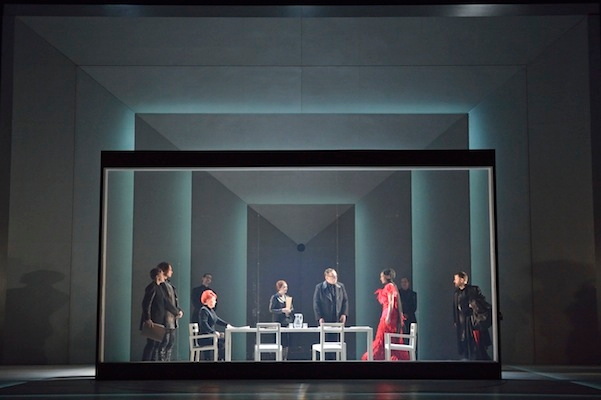I approach any production of Mozart’s last opera, La clemenza di Tito, in a state of acute trepidation: it’s not pleasant sitting bored through nearly three hours of one of your favourite two or three composers, one whom you regard as perhaps the most astonishing artist who ever lived. But that is how La clemenza di Tito has nearly always affected me — first, before it was revived in theatres, on a dodgy old Nixa recording, then, fairly often since, in various opera houses, its having now become a repertoire piece, something which was inconceivable only 40 years ago.
Still, despite its canonisation, its defenders — its admirers still, significantly, regard themselves in that way — tend to strike one or another defiant or uneasy note. Joachim Kaiser, doyen of music critics, in his useful book Who’s Who in Mozart’s Operas goes in for blatant one-upmanship: ‘A far greater appreciation of music is required to enjoy aesthetically the subtle distinctions among the figures in La clemenza than to love Figaro…Even to suspect how much sublime and craftsmanlike purity and sincerity went into La clemenza requires great sensitivity. The miracles of this work tend to be discovered late, if at all.’
David Cairns, in Mozart and his Operas, strikes a less unequivocal note: ‘Whether or not, in one’s heart of hearts, one warms to Tito, its seriousness of approach, care of workmanship and nobility of tone are incontrovertible.’ What neither of these two distinguished figures mentions, there or anywhere else, is the total absence in Tito of liveliness, life, individuality, the things that give the Da Ponte operas and Die Zauberflöte their immutable place in the heart of the operatic canon. These words workmanship, nobility, purity and sincerity can be deadly in their implication. What Tito is to Mozart, Romola is to George Eliot, and who can claim to have read that more than once, supposing they got to the end the first time? Yet it has all the virtues apart from a flicker of vitality.
Given the complete lack of individuality in the music, with the exception of that belonging to Vitellia, the fire-eating villainess, Tito presents directors with the enticing prospect of doing whatever they like with it, which may be one reason for its resurgence, as directors have taken over the operatic scene. John Fulljames, who is responsible for this new production for Opera North, has taken some decisions that didn’t seem to me to add anything, except the possibility of thinking about what they meant while the eternal recitativi secci pattered past, but at least he makes the plotline clear at every point, and there is almost nothing to distract one, there being almost no props and very little action. The period, if there is one, is contemporary: when the curtain rises, as the Overture gets under way, we see a committee of black-clad people sitting round a glass table. Everyone is in black, leather being the favoured material, except for Vitellia, who not only sports red hair nearly all the time, but also coloured gowns some of it. There is a huge screen on which projections play, so that the room changes shape and at the end of Act I looks like a sketch for a hateful modern metropolis.
Within this unappealing setting — attractiveness has become, it seems, an operatic vice — the action, though absurd and unconvincing, is presented with maximum clarity. Tito the long-suffering, who has less singing to do than the other principals, is the ever reliable Paul Nilon, who is an astonishing phenomenon. He hasn’t changed at all in appearance or vocally in more than 20 years, and the plangent, sometimes almost petulant sounds he delivers suit this character ideally. If he doesn’t look quite the kind of guy who would decide on three different empresses on one day, which tenor does?
The one he ends up with, the stormy Vitellia, is sung by Annemarie Kremer, Opera North’s Norma last year. The roles make similar demands, though Norma’s are more extreme. Kremer is an excellent actress, a Joan Crawford of the operatic stage, with a voice to match: not entirely reliable, but effective. The character who is inexplicably in love with her and prepared to perform dastardly acts at her command, Sesto, is sung by the star of the production, Helen Lepalaan, an Estonian with a great future. She did more than I thought possible to bring this character to life, in his torments and passions, and the production would be worth going to if only for her (him). Kathryn Rudge, too, as Annio, a comparatively minor character in the chain of A loves B loves C loves D that was Metastasio’s stock in trade, has force and expression, and Servilia, who returns his (her) love — not that it helps in this maelstrom — is sung for what she’s worth by Fflur Wyn.
The conductor is the highly capable Douglas Boyd. I found the overture rasping and hard-driven, but after that hardly noticed the conducting at all, which is the highest compliment I can pay it. I am no convert to Tito, but this is the best outing it has had in my experience.






Comments